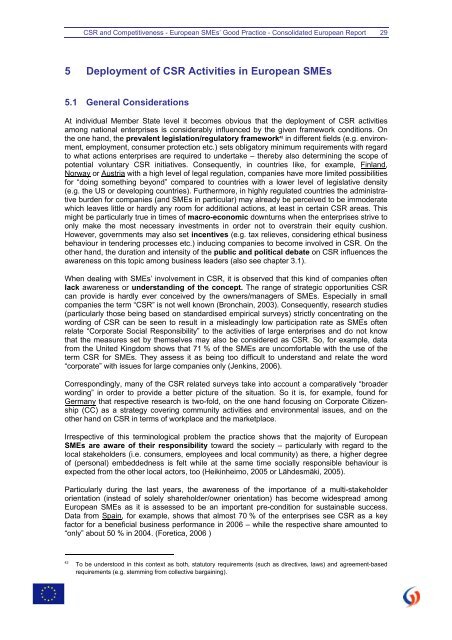CSR and Competitiveness European SMEs - KMU Forschung Austria
CSR and Competitiveness European SMEs - KMU Forschung Austria
CSR and Competitiveness European SMEs - KMU Forschung Austria
You also want an ePaper? Increase the reach of your titles
YUMPU automatically turns print PDFs into web optimized ePapers that Google loves.
<strong>CSR</strong> <strong>and</strong> <strong>Competitiveness</strong> - <strong>European</strong> <strong>SMEs</strong>’ Good Practice - Consolidated <strong>European</strong> Report 29<br />
5 Deployment of <strong>CSR</strong> Activities in <strong>European</strong> <strong>SMEs</strong><br />
5.1 General Considerations<br />
At individual Member State level it becomes obvious that the deployment of <strong>CSR</strong> activities<br />
among national enterprises is considerably influenced by the given framework conditions. On<br />
the one h<strong>and</strong>, the prevalent legislation/regulatory framework 42 in different fields (e.g. environment,<br />
employment, consumer protection etc.) sets obligatory minimum requirements with regard<br />
to what actions enterprises are required to undertake – thereby also determining the scope of<br />
potential voluntary <strong>CSR</strong> initiatives. Consequently, in countries like, for example, Finl<strong>and</strong>,<br />
Norway or <strong>Austria</strong> with a high level of legal regulation, companies have more limited possibilities<br />
for “doing something beyond” compared to countries with a lower level of legislative density<br />
(e.g. the US or developing countries). Furthermore, in highly regulated countries the administrative<br />
burden for companies (<strong>and</strong> <strong>SMEs</strong> in particular) may already be perceived to be immoderate<br />
which leaves little or hardly any room for additional actions, at least in certain <strong>CSR</strong> areas. This<br />
might be particularly true in times of macro-economic downturns when the enterprises strive to<br />
only make the most necessary investments in order not to overstrain their equity cushion.<br />
However, governments may also set incentives (e.g. tax relieves, considering ethical business<br />
behaviour in tendering processes etc.) inducing companies to become involved in <strong>CSR</strong>. On the<br />
other h<strong>and</strong>, the duration <strong>and</strong> intensity of the public <strong>and</strong> political debate on <strong>CSR</strong> influences the<br />
awareness on this topic among business leaders (also see chapter 3.1).<br />
When dealing with <strong>SMEs</strong>’ involvement in <strong>CSR</strong>, it is observed that this kind of companies often<br />
lack awareness or underst<strong>and</strong>ing of the concept. The range of strategic opportunities <strong>CSR</strong><br />
can provide is hardly ever conceived by the owners/managers of <strong>SMEs</strong>. Especially in small<br />
companies the term “<strong>CSR</strong>” is not well known (Bronchain, 2003). Consequently, research studies<br />
(particularly those being based on st<strong>and</strong>ardised empirical surveys) strictly concentrating on the<br />
wording of <strong>CSR</strong> can be seen to result in a misleadingly low participation rate as <strong>SMEs</strong> often<br />
relate “Corporate Social Responsibility” to the activities of large enterprises <strong>and</strong> do not know<br />
that the measures set by themselves may also be considered as <strong>CSR</strong>. So, for example, data<br />
from the United Kingdom shows that 71 % of the <strong>SMEs</strong> are uncomfortable with the use of the<br />
term <strong>CSR</strong> for <strong>SMEs</strong>. They assess it as being too difficult to underst<strong>and</strong> <strong>and</strong> relate the word<br />
“corporate” with issues for large companies only (Jenkins, 2006).<br />
Correspondingly, many of the <strong>CSR</strong> related surveys take into account a comparatively “broader<br />
wording” in order to provide a better picture of the situation. So it is, for example, found for<br />
Germany that respective research is two-fold, on the one h<strong>and</strong> focusing on Corporate Citizenship<br />
(CC) as a strategy covering community activities <strong>and</strong> environmental issues, <strong>and</strong> on the<br />
other h<strong>and</strong> on <strong>CSR</strong> in terms of workplace <strong>and</strong> the marketplace.<br />
Irrespective of this terminological problem the practice shows that the majority of <strong>European</strong><br />
<strong>SMEs</strong> are aware of their responsibility toward the society – particularly with regard to the<br />
local stakeholders (i.e. consumers, employees <strong>and</strong> local community) as there, a higher degree<br />
of (personal) embeddedness is felt while at the same time socially responsible behaviour is<br />
expected from the other local actors, too (Heikinheimo, 2005 or Lähdesmäki, 2005).<br />
Particularly during the last years, the awareness of the importance of a multi-stakeholder<br />
orientation (instead of solely shareholder/owner orientation) has become widespread among<br />
<strong>European</strong> <strong>SMEs</strong> as it is assessed to be an important pre-condition for sustainable success.<br />
Data from Spain, for example, shows that almost 70 % of the enterprises see <strong>CSR</strong> as a key<br />
factor for a beneficial business performance in 2006 – while the respective share amounted to<br />
“only” about 50 % in 2004. (Foretica, 2006 )<br />
42<br />
To be understood in this context as both, statutory requirements (such as directives, laws) <strong>and</strong> agreement-based<br />
requirements (e.g. stemming from collective bargaining).




